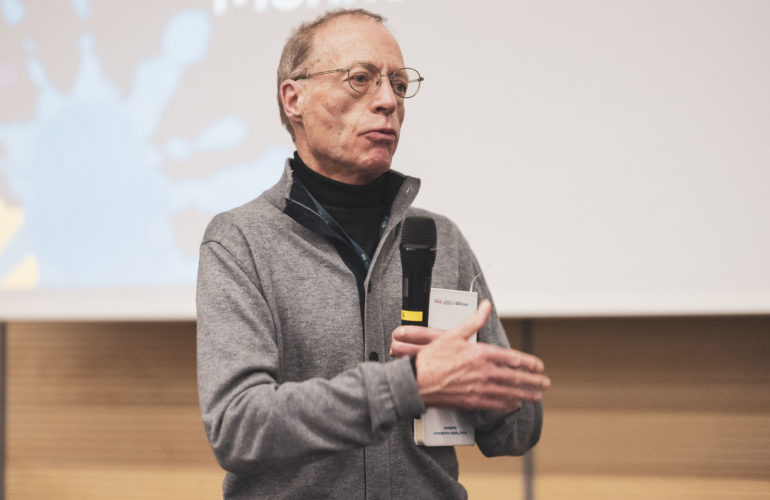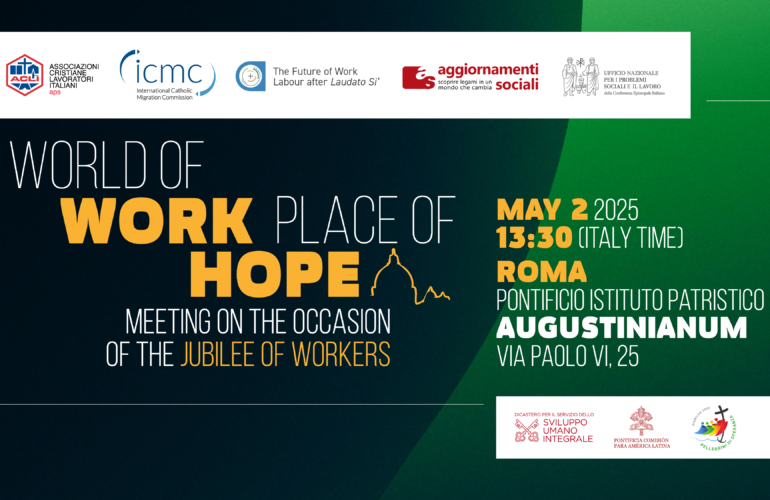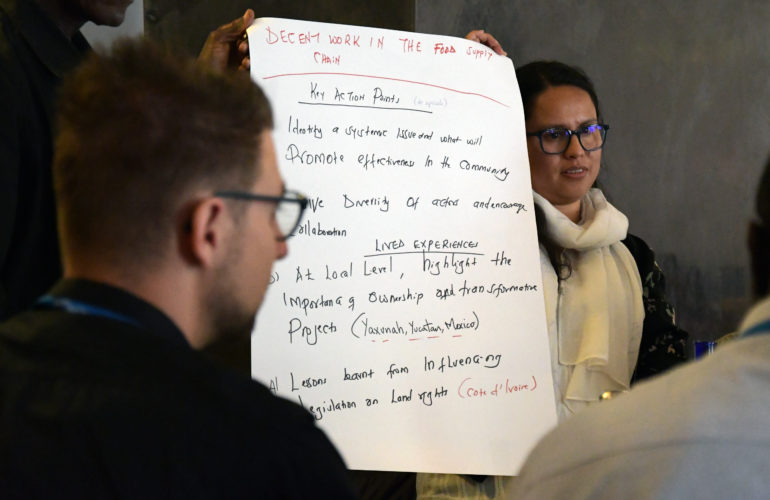Building Church Cooperation on Migration in Asia: ICMC Interviews Bishop Allwyn D’Silva
On 31 August to 3 September 2025, ICMC joined Church and civil society representatives from within the Asia region and around the world at the 4-day workshop Migrants in Asia and Our Response, held in Kuala Lumpur, Malaysia
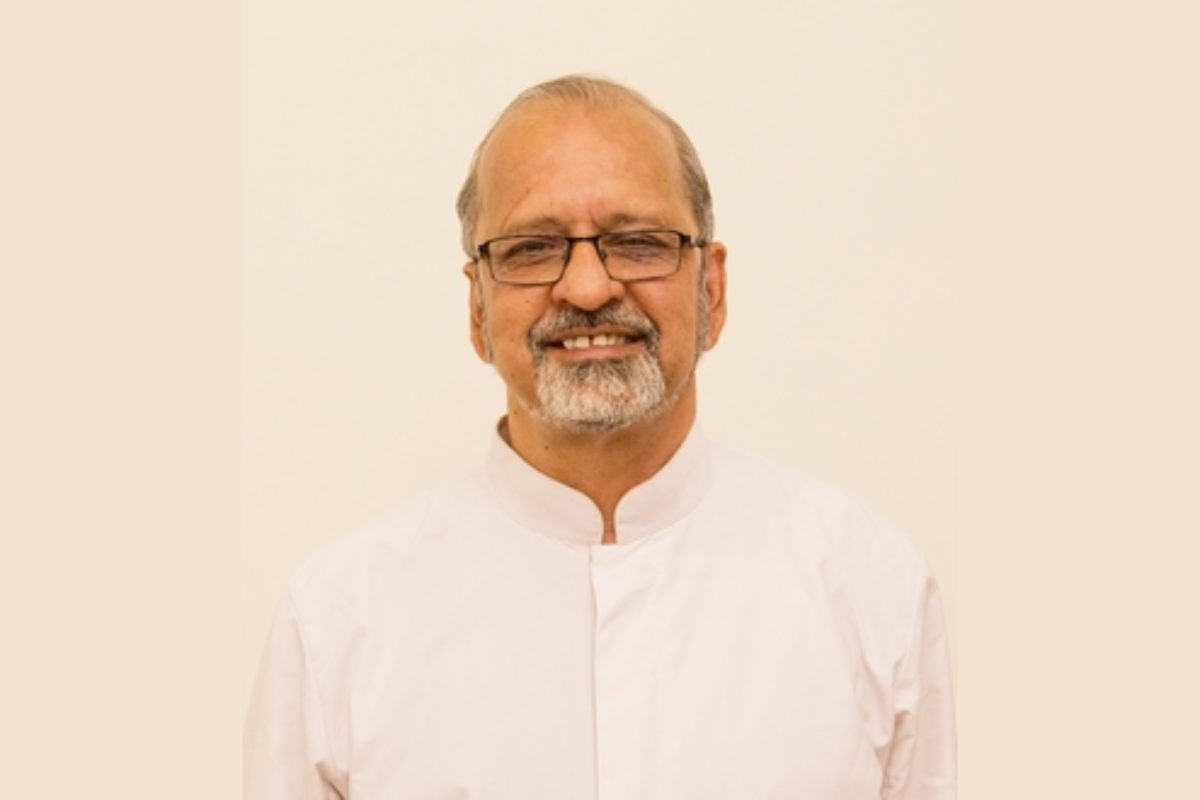
How did the workshop come about, and how will its outcomes be used to further strengthen and expand Church cooperation and responses for migrants and refugees in Asia?
To find out, we sat down with Bishop Allwyn D’Silva, Auxiliary Bishop Emeritus of Bombay, India, and Chairperson of workshop organizer the Office of Human Development at the Federation of Asian Bishops’ Conferences (FABC).
***
ICMC: Many thanks for agreeing to talk with us about the workshop! The event was organized by the Climate Change Desk of the FABC’s Office of Human Development. Could you tell us a bit more about the Desk, and your work in relation to migrants and refugees?
BA: You’re welcome! I’m Bishop Allwyn D’Silva, and I’m the Chairperson of the Office for Human Development at the FABC, where I work alongside three other Bishops and a secretary. It was 2011 when we really started thinking about climate change, and the Climate Change Desk was started around 2013. The Desk is just one of the activities of the Office for Human Development.
In 2017, our Executive Committee met, together with external experts and stakeholders, to really explore the question of what the priorities should be for our work, and migrants was one of the strong priorities that we have since taken forward. That decision was taken in part for strategic reasons, because we could build on the strong interest within the Church in the region generated by the situation of the Rohingya in Bangladesh, which was very prominent at that time. We were also guided by the support for migrants and refugees expressed by Pope Francis, which provided a strong basis to engage the wider Church in this area of work.
Our focus over the past eight years has been on enabling the sharing of expertise and best practice within the region. It’s a challenging area, because a lot of work with migrants is not being documented. My team have visited Sri Lanka and Malaysia to try to fill this gap, and we’ve also researched practices in a number of other countries in the region.
Beginning during the global COVID-19 pandemic, we’ve enabled the exchange of practice and expertise via a series of regional webinars for Church and Catholic-inspired organizations assisting and advocating for migrants across the region. This approach has been really successful in engaging the participation of Justice and Peace Commissions of the national Bishops’ Conferences in Asia, essentially national level equivalents of the Office for Human Development, and of Migrant Desks where Conferences have established these structures.
ICMC: The workshop took a different approach to your earlier webinars, moving beyond solely sharing practices, to focus on more structured Church cooperation on migration in the region. Why the new and different focus?
BA: At present, the situation is almost totally anti-migrant in every sense.
Firstly, it’s very clear that in most Asian countries migrants’ lives are becoming more difficult, and people are more and more affected by climate change and political situations. Even here in India, people are leaving the country because there’s such a lack of decent employment opportunities, so the situation across the region is very grim.
Secondly, this anti-migrant present also applies to the resources that are available for organizations working to assist migrants. Our moves to establish a deeper collaboration are borne out of an understanding of the need to find ways to make our combined work more effective, in this new context of vastly reduced resources. We can do this by directly cooperating, getting ideas from one another, and sharing our expertise. For me the sharing of the work that everyone is doing remains one of the most important aspects.
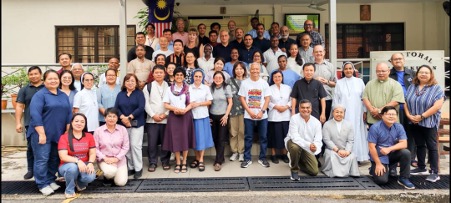
The need to build deeper and more sustainable Church cooperation on migration, both within and outside the region, has become very apparent in the course of our work, in particular in recent years. The idea for the workshop was formed together with a core group of organizations participating in our webinars, including ICMC, Caritas Asia, and the Office for Justice, Peace and Integrity of Creation (JPIC) of the Order of Friars Minor. Together we wanted to bring together the organizations we think are crucial to building this new network, including ICMC, to identify our priorities and plan next steps. It was very important that the workshop be held in-person, so as to enable a deeper exchange and build more meaningful connections.
ICMC: What were your personal main takeaways from the workshop? What did you learn?
I think an important key aspect that was reinforced in the discussions was the unique pastoral care role of the Church. In my diocese of Bombay, for example, we make contact with migrants, and try to meet with them regularly just to see how they’re doing and offer some contact. Sometimes internal migrants don’t speak the local language, but even where we struggle with this, we are still making contact and providing care for the whole person. We likely cannot solve all the migrant’s problems, but upholding his or her human dignity in this way is at the core of our mission.
One specific aspect of the workshop agenda that I personally really valued was the Exposure Program segment, organized by ICMC. The workshop was held in Kuala Lumpur, and this part of the program enabled us to visit some important local places for migrant communities, and hear presentations from local legal experts, NGOs, and migrant associations. Really understanding the detail of a local situation was a great learning experience, which I very much appreciated.
ICMC: The workshop took place against a backdrop of strong anti-migrant narratives, which participants consistently mentioned as a challenge for their work and those they are assisting. What is your experience in this context, and how do you feel the Church should respond?
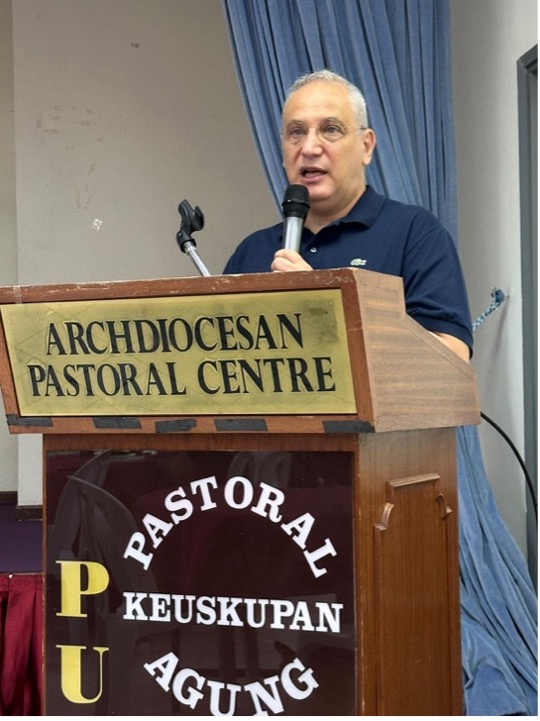
This anti-migrant present is of course also borne out in public narratives and attitudes. In my country India, for example, we have interstate migration, meaning people moving from one part of the country to another in order to find work. The people in the areas where they arrive complain about ‘the migrants taking our jobs’. But we know that migrants are doing menial and low-paid work, and that without interstate migration many of these places would absolutely cease to function.
I feel the Church has a role to play in raising awareness of these realities. We are able to engage those who may be uncomfortable or unhappy with migration, and to widen their knowledge and understanding. We must insist that migrants don’t come here to take something from you, but rather to work, find safety, and secure their dignity.
One can acknowledge that the current economic situation is difficult for everybody, and understand where fear and mistrust might come from, but we must also urge a proper recognition of the actual impacts the economic situation is having in relation to migration. The large increases in the number of young people leaving India because of the lack of opportunities here is much more troubling, for example, and much more deserving of our attention in this context. More broadly, the far right is increasingly mobilizing against refugees and migrants, and is growing in its support in countries all over the world, including in Asia. The Church has an important role to play in raising people’s awareness, and trying to push back.
There is also a small minority within the Church that encourages opposition to migrants, which we must address, alongside wider attempts to find theological justifications for these perspectives. Here we must remain firmly rooted in our principled understanding of the human dignity of all persons. When I’m asked to speak about migrants, I say that they are children of God who deserve dignity. They move, often for reasons outside their control, to try to obtain that dignity. But they are suffering, and it is this that calls us to act.
ICMC: Throughout the workshop, time was allocated for small group discussion and reflections guided by the ‘Conversation in the Spirit’ methodology. Can you tell us a bit more about this approach and how it works?
The approach is drawn from the synodal principles of listening, prayer, and discernment, emphasized by Pope Francis and central to the synod on Synodality.
it’s a fairly recent addition to our work, in that I first came across it at a 2022 conference, where its use was restricted to specific ‘coffee table’ events on the side of the main agenda. I later contrasted my experience at the coffee tables to that at the last session of the same conference, where I saw a lot of people arguing and no conclusions being reached. For me, it immediately highlighted the value of a method that requires you to listen with an open heart to one another’s personal experiences and reflections, and to hear and share what the Spirit is telling you.
The approach requires that someone with the right skills and understanding introduces the approach to participants, clarifies questions and expectations, and shapes its implementation. We sought advice on the methodology and I then conducted it a few times, to overall very good feedback. It’s crucially important to introduce the method well, which I do with a presentation and short video introduction (above). At the workshop, where I was assisted in leading the approach by ICMC’s Mr. Davide Bernocchi, we again found the approach very fruitful, because enables people to reflect on what they hear and find some conclusions. It also brings those working at different levels into direct contact and exchange with one another, which provides another key learning experience for all.
ICMC: What are the next steps for the network, and what priorities will you seek to address going forward?
A number of priorities for our cooperation emerged really strongly from the workshop, forming a strong basis on which to shape our future cooperation and action on migration. I’m thinking in particular of the clearly articulated need for us to focus our efforts on areas such as legal reform and accountability, labor exploitation, trafficking, and gender-based violence.
I’m very clear that it’s our responsibility to develop our work properly, so I’m really pleased that training for pastoral workers will likely be one of the key priorities for our future cooperation. At the workshop we talked about an online training program, which is potentially a great solution to reach Church workers across the region, and again showed the importance of our being able to come together and exchange ideas.
What’s really important now is not to lose the momentum and interest that the workshop has generated, and to maintain the network. So we’re planning a meeting of the core group within the next month, to follow up on the workshop’s outcomes and finalize a clear plan for our next steps in the short and medium term. By this I mean developing a clear set of tangible activities for the coming six months, to ensure the things we discussed at the workshop result in a deeper, more sustainable Church collaboration and action on migration in the future.
***
Read the workshop keynote address given by ICMC President Christine Nathan
View the workshop agenda, and read the full Workshop Report

Rachel Westerby
Independent writer and researcher on migration and refugees.
